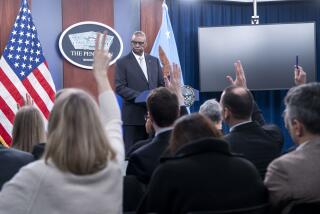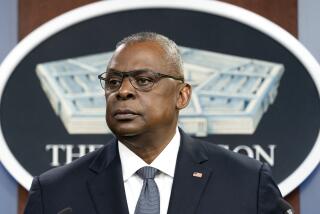Panel told of a sickbed face-off
- Share via
WASHINGTON — James B. Comey, then the acting U.S. attorney general, was on his way home one night in March 2004 when he got an urgent call from the office on his cellphone.
The distraught wife of Atty. Gen. John Ashcroft, who was recovering in the hospital from gallbladder surgery, had called the Justice Department to report that her husband was about to get two uninvited guests. The visitors were two top aides to President Bush, and they wanted Ashcroft’s signature on a secret national security directive that Comey had rejected only a short time before.
“I was very upset. I was angry,” Comey told a Senate panel Tuesday. And he was determined to get to the hospital first.
Thus began one of the most unusual episodes in Bush’s first term, a showdown over warrantless wiretapping that nearly brought the resignations of Ashcroft and several other top administration officials until the president intervened.
The saga of the race to Ashcroft’s bedside left senators amazed. While the hospital encounter had been described previously in general terms, Comey’s was the first eyewitness account, and offered new and dramatic insight.
Comey got to the hospital first and Ashcroft didn’t sign the document. But it was a close call, Comey said. “I thought I just witnessed an effort to take advantage of a very sick man,” he said.
His story was more than just an insider’s anecdote: One of the White House officials who arrived at Ashcroft’s bedside was Alberto R. Gonzales, whose performance as attorney general is receiving critical attention in Congress.
Comey’s testimony -- at a Senate Judiciary Committee hearing called to scrutinize the firing of eight U.S. attorneys last year -- added fuel to the debate about whether Gonzales is fit to run the Justice Department.
“I would say what happened in that hospital room crystallized Mr. Gonzales’ view about the rule of law: that he holds it in minimum low regard,” Sen. Charles E. Schumer (D-N.Y.), a leading Gonzales critic, said at the hearing. “It’s hard to understand after hearing this story how Atty. Gen. Gonzales could remain as attorney general, how any president -- Democrat, Republican, liberal, conservative -- could allow him to continue.”
The Justice Department on Tuesday declined to address the testimony of its former No. 2 official.
“We cannot comment on internal discussions that may or may have not taken place concerning classified intelligence activities,” spokesman Dean Boyd said. He added that the program had been subject to “vigorous” oversight.
At the White House, spokesman Tony Snow told reporters that Bush has “full confidence in Alberto Gonzales.” He refused to discuss Comey’s testimony, which he described as “old conversations.”
“You’ve got somebody who’s got splashy testimony on Capitol Hill. Good for him,” Snow said.
Comey’s testimony came a day after his successor, Paul McNulty, announced that he planned to resign as deputy attorney general this summer, making him the fourth Justice official to step down since the U.S. attorney purge became public earlier this year. McNulty cited the financial burden of having college-age children, but he was known to have been dismayed by how the firings were handled, and has alleged that he was left out of the loop by Gonzales aides until the two-year process was almost complete.
Democrats have alleged the firings were calculated to manipulate public corruption cases in a way that would benefit Republicans.
Gonzales struck back at McNulty on Tuesday and attempted to shift some of the blame to his departing aide, saying that he relied on McNulty more than any other aide to decide which prosecutors were to be fired. “You have to remember, at the end of the day, the recommendations reflected the views of the deputy attorney general. He signed off on the names,” Gonzales told reporters at a National Press Club event. “And he would know better than anyone else.”
On Capitol Hill, Comey took pains not to identify what he termed the “classified program” that prompted the race to the hospital. But lawmakers said they believed he was referring to the Terrorist Surveillance Program that the Bush administration secretly launched after the Sept. 11 attacks.
The electronic eavesdropping program, administered through the National Security Agency, has swept up international phone and e-mail correspondence of persons in the U.S., and has been of great importance in anti-terrorism investigations, administration officials have said.
But the program also sparked controversy because, at first, it was conducted without the approval of the Foreign Intelligence Surveillance Act court -- a tribunal created under a 1978 law to monitor domestic spying in the U.S. after Watergate and other abuses. Bending to criticism that the plan was of dubious legality, the Bush administration agreed in January to submit wiretap petitions under the program to the FISA court.
Ashcroft and the Justice Department initially had approved the program but had second thoughts after a new head of its office of legal counsel, Jack Landman Goldsmith, began raising concerns about whether it violated the law, Comey said Tuesday.
A week before the attorney general fell ill, Comey said, he and Ashcroft decided that there were legal problems with the program and that they would oppose recertifying it.
With the program set to expire on March 11, 2004 -- and with Ashcroft in the hospital -- administration officials approached Comey to get the Justice Department’s blessing for reauthorization, but he refused to give it. That touched off the flurry of late-night maneuvering on March 10 that ended up in Ashcroft’s hospital room and, later, at the Justice Department and White House.
Comey said he was being driven home when he received a call from Ashcroft’s chief of staff, David Ayres. Ayres relayed the fact that Ashcroft’s wife, Janet, had just received a call from the White House that Gonzales and then-White House Chief of Staff Andrew H. Card Jr. were en route to the hospital.
Mrs. Ashcroft was upset because she had forbidden visitors and phone calls; her husband was recuperating from surgery the previous day.
Suspecting an end run was in the works, Comey ordered his security detail to head for George Washington University Medical Center; he called FBI Director Robert S. Mueller III and several top aides to meet at the hospital to protect Ashcroft from any effort at coercion.
“I raced to the hospital room, entered, and Mrs. Ashcroft was standing by the hospital bed. Mr. Ashcroft was lying down in the bed, the room was darkened,” Comey said. “And I immediately began speaking to him, trying to orient him as to time and place, and try to see if he could focus on what was happening, and it wasn’t clear to me that he could. He seemed pretty bad off.”
Comey said he stepped out into the hallway and spoke by phone to Mueller, who instructed the FBI agents not to allow Comey to be removed from the room “under any circumstances.” Two other senior Justice officials soon joined Comey and the Ashcrofts in the room.
Shortly thereafter, Comey said, Gonzales -- carrying an envelope apparently containing the presidential spying order -- arrived with Card.
“They greeted the attorney general very briefly. And then Mr. Gonzales began to discuss why they were there: to seek his approval for a matter, and explained what the matter was,” Comey said.
“And Atty. Gen. Ashcroft then stunned me,” Comey continued. “He lifted his head off the pillow and, in very strong terms, expressed his view of the matter, rich in both substance and fact ... drawn from the hourlong meeting we’d had a week earlier ... and then laid his head back down on the pillow, seemed spent, and said to them, ‘But that doesn’t matter, because I’m not the attorney general.’ ”
Card and Gonzales then left, he said.
According to Comey, Card called later to angrily demand that he meet him at the White House. “I responded that, after the conduct I had just witnessed, I would not meet with him without a witness,” Comey said.
“He replied, ‘What conduct? We were just there to wish him well,’ ” Comey testified. “And I said again, ‘After what I just witnessed, I will not meet with you without a witness.” Comey then tracked down Solicitor General Theodore B. Olson at a dinner party, and Olson agreed to be the witness. After meeting with other Justice officials at department headquarters, Comey said he and Olson headed to the White House about 11 p.m. but that nothing was resolved.
Comey said the White House renewed the program the next day without his approval.
With the White House disregarding the Justice Department’s legal advice, Comey said, he, Ashcroft, Mueller and several other senior Justice officials made plans to resign. They relented only after Bush agreed to restructure the program after meetings with Comey and Mueller the next day.
“It has some characteristics of the ‘Saturday Night Massacre,’ ” said Sen. Arlen Specter (R-Pa.), the ranking Republican on the Senate Judiciary Committee, referring to the Watergate-era episode in which the attorney general and his deputy resigned rather than fire a special prosecutor investigating wrongdoing by the Nixon White House.
Some observers said Comey’s testimony reinforced a view of Gonzales as someone who is loyal to Bush and little else.
“The picture he painted of department leaders ... standing up to pressure from the White House, ready to quit rather than give up their principled view of what the law required, stands in stark contrast to the picture that has emerged from Gonzales’ tenure,” said Daniel Richman, a Fordham law school professor and former federal prosecutor.
*
More to Read
Get the L.A. Times Politics newsletter
Deeply reported insights into legislation, politics and policy from Sacramento, Washington and beyond. In your inbox twice per week.
You may occasionally receive promotional content from the Los Angeles Times.










